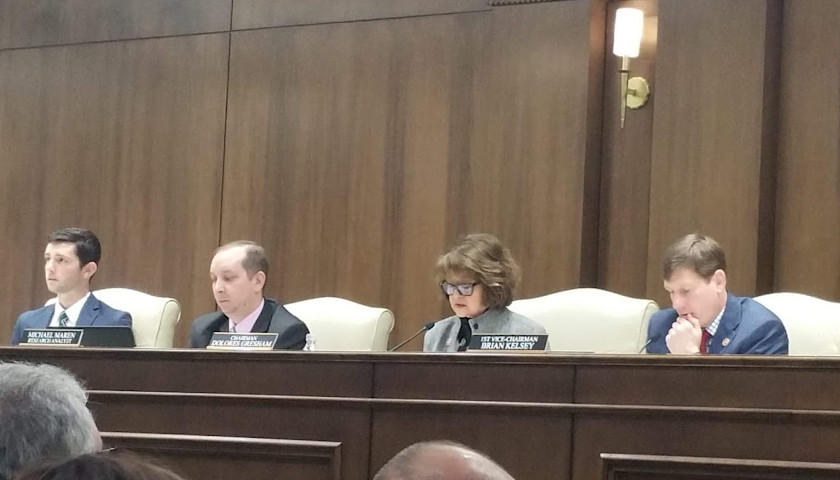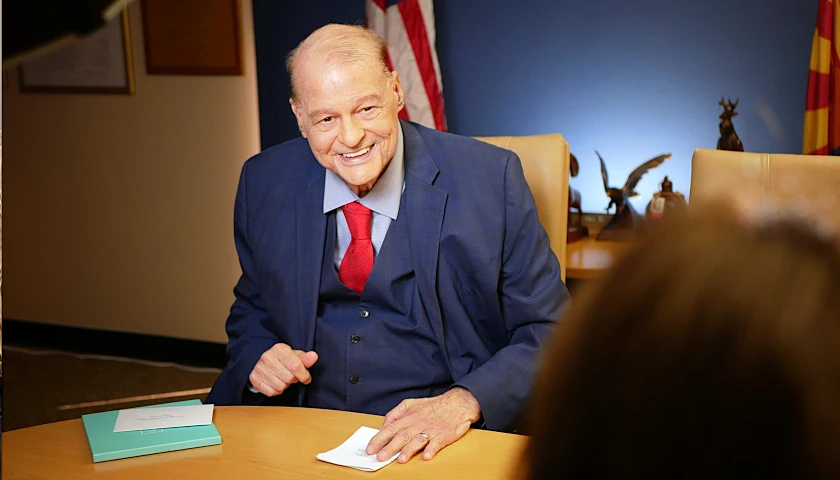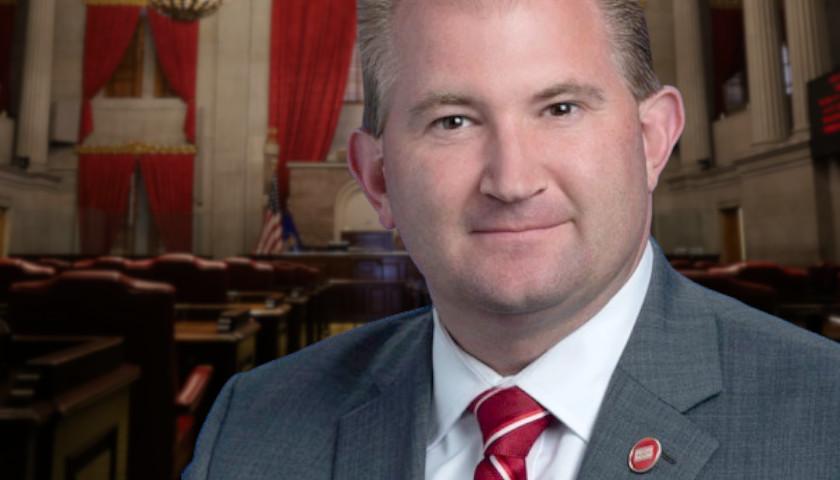NASHVILLE, Tennessee – Governor Bill Lee’s most significant education initiative, Education Savings Accounts, made it through another major hurdle as it passed the Senate Education Committee Wednesday by a vote of 6 to 3.
Senator Dolores Gresham (R-Somerville), who is also the Chair of the Education Committee, carried the bill as SB 0795. As such, Sen. Gresham turned the gavel over to 1st Vice-Chair, Senator Brian Kelsey (R-Germantown) as she presented the bill.
The large Senate Hearing Room I was nearly standing room only with a mix of proponents and opponents to the measure. Discussion of the ESA bill dominated the meeting, which went over its scheduled two hour time period.
 Sen. Gresham introduced the bill by saying that the Education Savings Accounts (ESAs) will provide opportunities for students where there is a concentration of lower performing schools.
Sen. Gresham introduced the bill by saying that the Education Savings Accounts (ESAs) will provide opportunities for students where there is a concentration of lower performing schools.
“The best local control that can be established in our state’s education landscape is when parents make that decision about how their children are to be educated. This is particularly true for students in areas with multiple lower performing schools and limited high-quality educational options.”
Reflecting on the fact that the legislation is an initiative of Governor Bill Lee, Sen. Gresham continued, “High-quality school choice options is a priority of this Governor, because he has seen firsthand the impact that quality choices in the education space can have on a student. I am profoundly grateful, I can tell you, to live in Tennessee where we have a Governor who, by a wide margin we elected, and who is a visionary leader with specific priorities to make life better for all Tennesseans. He campaigned for two years on issues like this and we’re proud to stand here for him to bring you this bill.”
Sen. Gresham continued her presentation of the bill by reading through a series of questions and answers beginning with “Why this bill?”
“Tennessee has lead the nation with important K-12 education reforms over the last 10 years, and we have seen the payoff. Our student outcomes have been among the fastest improving in the country, but sustained improvement requires constant innovation and we must keep innovating and leading.”
“Not all Tennesseans, however, have benefited from this growth. Despite overall gains, low-income students, on average still have lower outcomes than their non-economically disadvantaged peers.”
Sen. Gresham then laid out two ends of the spectrum where, at one end, two-thirds of third graders are not reading at grade level. Sen. Gresham followed that up by saying, “Let that sink in,” and then repeating the statistic.
“On the other end,” reported Sen. Gresham, “for the first time ever in the history of Tennessee, we have an 89 percent graduation rate from our high schools. But, listen to this, 82 percent of those graduates that go on to higher ed require remediation in English and Language Arts and in Math.”
“This is one piece of the Governor’s top priority which is to improve our schools and get our state out of the bottom half of schools nationally. Other initiatives include a 2.5 percent pay raise for teachers, fully funding and investing in our public schools and increasing access to vocational, technical and agricultural education opportunities for students.”
Moving on to the main points of the bill, Sen. Gresham said she would be covering eligible students, enrollment, funding, eligible schools and programs, testing requirements and generally how we anticipate ESAs will be implemented and summarized the bill:
– districts that have three or more schools in the bottom 10 percent of all schools in Tennessee, which would not change unless the legislature passes a new law in future years, and currently includes Shelby County Schools, Knox County schools, Hamilton County Schools, Metro Nashville Schools, Jackson-Madison Schools and the Achievement School District.
– the student must be enrolled in a Tennessee school the previous year or coming into kindergarten;
– must have an income level at or below twice that which qualifies for free lunch;
– Category I, II and III independent schools would qualify, but would have to be approved by the state department of education, as well as homeschooling;
– there is a cap in the first year of 5,000 students out of nearly 1 million students; year two 7,500; year three 10,000; fourth year 12,500; and fifth year at 15,000 with a hard stop at 30,000, which is different than that of the House version of the bill;
– if the cap is met, there will be a lottery to prioritize those who have a sibling in the program, zoned in the bottom 5 percent and low-income students;
A priority is given to low-income students, Sen. Gresham pointed out, because achievement gaps are not racially or ethnically oriented, but rather income oriented.
Accountability is a big priority, according to Sen. Gresham, to create not just options, but high-quality options. ESA participating students will have to take the math and English language arts state tests for tracking of progress and growth. There is also an option for a norm reference test.
In perhaps the ultimate of accountability, Sen. Gresham informed, “If schools or providers are not getting the job done for our kids, the department of education can remove them from the program.”
Additionally, an annual report on the progress of the program will be generated and reported publicly.
Answering the objection based on potential fraud by the participants, Sen. Gresham said that in the education choice program already being administered for disabled students, there are fraud protections in place. Debit cards will not work, said Gresham, in places where fraudulent activity might occur and there are parts of the program that requires the department to build in fraud protection.
Sen. Gresham made an interesting point regarding opponents’ concerns expressed about fraud, which would be committed by parents of the students currently attending public schools, “Our system should be designed that presumes the competence and the innocence of parents, not their guilt,” which she repeated a second time to make the point.
The flexibility of an ESA empowers parents to make the best decisions for their children for their schools, likening it to a health savings account, said Sen. Gresham, where funds are used for approved items related to education which she went on to read.
- Tuition or fees at participating schools; Textbooks required by the participating school;
- Tutoring services provided by a tutor or a tutoring facility that meets the requirements established by the department of education;
- Payment for purchase of curriculum including any supplemental materials or instruments required by the curriculum;
- Fees for transportation to and from a participating school or educational provider paid to a fee-for-service transportation provider;
- Fees for early postsecondary opportunity courses and examinations required for college admissions like the ACT, SAT or LSAT;
- Services provided under a contract with a public school including individual classes or extra-curricular programs;
- Computer hardware, technological devices, or technology fees approved by the department, if the computer hardware, technological device, or technology fee is used for the student’s educational needs and is purchased through a participating school, private school, or provider;
- School uniforms, if required by a participating school;
- Tuition and fees for summer education programs and specialized afterschool education programs, as approved by the department, which do not include afterschool childcare;
- Tuition and fees at an eligible postsecondary institution;
- Textbooks required by an eligible postsecondary institution;
- Educational therapy services provided by therapists that meet the requirements established by the department and the state board; or
- Fees for the management of the ESA by a private or non-profit financial management organization, as approved by the department.
A three-year grant program that invests in the district will also be in effect to replace an equal amount of funds for the participating student and will be converted to school improvement grants for priority schools when the initial grant program ends.
Following Sen. Gresham’s approximately 15-minute review of the amendment that makes the bill, Sen. Kelsey went out of session to hear testimony which was limited to five minutes for each witness.
First to testify in opposition of the bill were Dale Lynch, Executive Director of Tennessee Organization of School Superintendents (TOSS) and Ben Torres, Deputy General Counsel of the Tennessee School Board Association. Both organizations are funded primarily with taxpayer dollars through membership fees paid by the local superintendent or director of schools and the school board members out of the school budgets and, as reported by The Tennessee Star, lobby the state legislature. Additionally, the Tennessee School Board Association is approved by the state law to conduct required continuing education of local school board members.
Lynch, referring to the map that showed Tennessee as one of the fastest improving states, said he heard repeatedly the statement “green in the sea of purple,” and added “Let’s just keep with what we’re doing and not back up. Forge ahead and stay the course.”
Giving all the credit to Sen. Gresham, Lynch said, “Let’s stop fighting over our kids and let’s start fight for our kids. That’s why we’re here today. We’re here to support 1 million kids in our Tennessee public schools. That’s why TOSS opposes this bill,” said Lynch.
Lynch said he would focus on one issue – accountability – and that it’s a good week to do it with testing beginning this week. He also spoke of fiscal accountability as funding through Basic Education Program (BEP) is about to be released.
TSBA’s Torres also mentioned the improvement map and spoke of accountability through assessments which inform the General Assembly for decision making.
A new panel in favor of the ESA legislation came forward including Lennie Jarratt, Heartland Institute; Ryan Mahoney, ExcelinEd; Shaka Mitchell, American Federation for Children; Harrison Stuart, Episcopal School of Nashville; and Glen Gaugh, parent.
From Heartland Institute, a national nonprofit free-market think tank, Jarratt reported that according to the nation’s report card, Tennessee is below the national average in both fourth and eighth grade in reading and math, but above in science. Less than four in 10 are at or above proficiency in our nation’s report card and in the bottom half of states in the country. As compared to neighboring states, Tennessee is below four states and above three states.
Jarratt went on to answer a number of rhetorical questions about ESAs and public schools. One piece of information Jarratt shared relative to ESAs taking away funding from public schools was that if a student were to leave a school system, on average funding would increase $338 per pupil. That statement generated several questions by committee members later in the meeting.
ExcelinEd’s Mahoney spoke of the recent analysis of 100 gold-standard, peer-reviewed studies on the effects of private choice programs nearly every single one of those studies found positive effects. Those positive effects are not just for those participating students, but the public schools and carry forward after graduation.
Mitchell said that at American Federation for Children, “What we believe in is that every student deserves meaningful access to the educational setting that meets his or her unique needs.” He went on to say that he was in Memphis earlier in the week where, in a city with 44 schools in the bottom five percent, the school decided not to do a national search for a new school director, and instead, will continue with an interim director.
In Nashville, the school director’s last day is Friday, as reported by The Tennessee Star, and the system will also be under the direction of an interim director.
“A conundrum that many parents face,” said Mitchell a father of a third-grader in Nashville, “when they have a five-year-old, they roll the dice and say we’re going to ride this out in kindergarten and see what happens and we’re going to cross our fingers,” while actually doing so to demonstrate, ”and if we can get four more years, eight more years, 12 more years like this, then we’ll be alright.”
“But, they don’t,” continued Mitchell, “and the data reflects that in our biggest cities now with national renown in some cases, fewer than one in every four students can read or do math on grade level.”
As a final thought, Mitchell said parents don’t have children so that those children can generate dollars for schools. “I believe we are gifted with these children and it is then our responsibility to create educational options that meet their needs.”
Glen Gaugh, the parent of two sons one of whom is home-schooled and the other is a public elementary school student, spoke of the different needs of each and how the ESA program will assist his family in the future.
Episcopal School of Nashville founder, Stuart, said the school was created to provide more access and availability and the majority of their funding comes from tuition of $9,975 per student, although through philanthropy 49 percent receive discounted tuition. If the ESA measure were to pass, Stuart said it would provide a great tool to serve more children who know no other option.
One interesting point about funding was that both Shaka Mitchell of American Federation for Children and Senator Kelsey cited statistics relative to situations where student populations had decreased, yet funding had increased to those districts.
Following the testimony, the Senate committee members began a lengthy question and answer session with the witnesses, much of which focused on the financial aspects of the program and impact to the public schools.
While the meeting is regularly scheduled for a two-hour period before the next committee is scheduled to use the room, the Education Committee was bumping up against that timing without having completed the discussion. Fortunately, Senator Rusty Crowe (R-Johnson City) as a member of the Education Committee and Chairman of the Health and Welfare Committee scheduled to be in the room next, said it would be acceptable for the Education Committee to run over.
After a parliamentary inquiry by Senator Jon Lundberg (R-Bristol) clarifying which amendment was being discussed, he called for the question. By voice vote, the amendment that made the bill was adopted by unanimous voice vote.
After some brief remarks by Senators Mike Bell (R-Riceville) and Kelsey, Sen. Gresham was once again recognized for closing remarks, which she delivered without notes both powerfully and passionately.
Sen. Gresham said she was “disappointed that the opposition to the bill could essentially be stated in one sentence, ‘We shouldn’t have parental choice, because it’s going to cost me money,’” adding that troubles her and that it is very difficult for her to accept.
She went on to say, incredulously, that she totally gets it, “because what we have done is we have established a system of education that makes children a profit center.” Putting it another way, “I’m not going to get paid unless I have more kids in my school.”
“You know, there’s something really wrong with that. Our system is profoundly flawed, because we made children a profit center.”
Sen. Gresham said that the ESA is just a mechanism for parental choice and parental choice is able to empower parents who have children who don’t necessarily fit in traditional public education.
“We know we have children languishing in lower performing schools and not only that, it’s been for years,” said Sen. Gresham, pausing to look around the room before saying again, “for years.”
“And so now we offer parents an opportunity to bring their children out of one of those low performing schools for a better choice.”
Sen. Gresham then portrayed a scenario, “I could just see parents going in to see a principal and saying we want to take Elizabeth and we’re going to put her in another school so we won’t be here very much longer and the principal says, oh no, you can’t do that, because we need the money.”
Showing her support for public education, Sen. Gresham said, “Traditional public education is the backbone of our country. We will continue to support that and try to make a world-class system right here in Tennessee. I’ve heard the Governor say that. It brought joy to my heart that his goal is the same as mine.”
Sen. Gresham continued, deliberately and looking at the many attendees in the audience, “We have to be able to offer parents a choice in how they educate their children, because the principle is that the education of children is the obligation of parents, not the state. The state has a compelling interest in the education of these children for two main reasons. One is that a literate society is a free society and the second is the preservation of the republic.”
“Public education is everything that we think about on this committee, everything that we do on this committee, everything that we plan, everything that we’ve done in the past is to foster public education. At the same time, there’s no reason why we cannot give parents a choice in how they educate their children,” concluded Sen. Gresham.
As is standard operating procedure in all Senate committees, a roll call vote was taken to advance the bill to the Senate Finance Committee where it is scheduled to be heard on April 16.
Voting aye were Senators Mike Bell (R-Riceville), Rusty Crowe (R-Johnson City), Dolores Gresham (R-Somerville), Ferrell Haile (R-Gallatin), Brian Kelsey (R-Germantown) and Jon Lundberg (R-Bristol). Senators voting No were Raumesh Akbari (D-Memphis), Steve Dickerson (R-Nashville) and Joey Hensley (R-Hohenwald).
Earlier in the day, the House version of the bill, HB 0939, passed the Finance, Ways and Means Subcommittee on voice vote with the Ayes prevailing. Requesting to be recorded as voting No were Representatives Patsy Hazlewood (R-Signal Mountain), Gary Hicks (R-Rogersville) and Mathew Hill (R-Jonesborough).
HB 0939 is scheduled to be heard in the full House Finance, Ways and Means Committee on April 16.
– – –
Laura Baigert is a senior reporter at The Tennessee Star.
Background Photo “Dolores Gresham” by the Tennessee Senate Education Committee.






“…we have an 89 percent graduation rate from our high schools. But, listen to this, 82 percent of those graduates that go on to higher ed require remediation in English and Language Arts and in Math.”
That leaves 18% of the graduates that do not need remedial work. .89 x .18 = .16 I.e., only a 16% chance your child will graduate from TN public high school and not require remedial work if they continue to college. But it will be “FREE” – except that we already paid for that to be taught once. They also are r
Vouchers limited to 5,000 kids. Out of approx. 1 million students, that is one-half of one percent. 99.5% of children in TN still have no choice (except to pay twice). Once this plan really balloons to 15,000 in five years (after your kid is how far behind?) then a whopping 98.5% of children in TN still won’t have a choice (except to pay twice).
This is an insignificant joke in terms of any real reform. As it has always been done, this game will be played the same as it has all across this country – and has already been demonstrated with Tennessee Virtual Academy. The government monopoly will only allow the worst of the worst academically to escape (and how far behind academically are those children when they leave – because we damn sure measure it) then in a year or two when the alternative the parents chose hasn’t successfully overcome the academic deficit those students arrived with, the voucher/esa plan will be declared a failure. See NEA water-carrier Andy Berke criticizing TN Virtual Academy after one year of operation for “almost” being in the bottom 10% of school performance and demanding they be closed – but what about the actual bottom 10% – and the fact that they pulled up Union County’s scores (the district they were rolled into)?